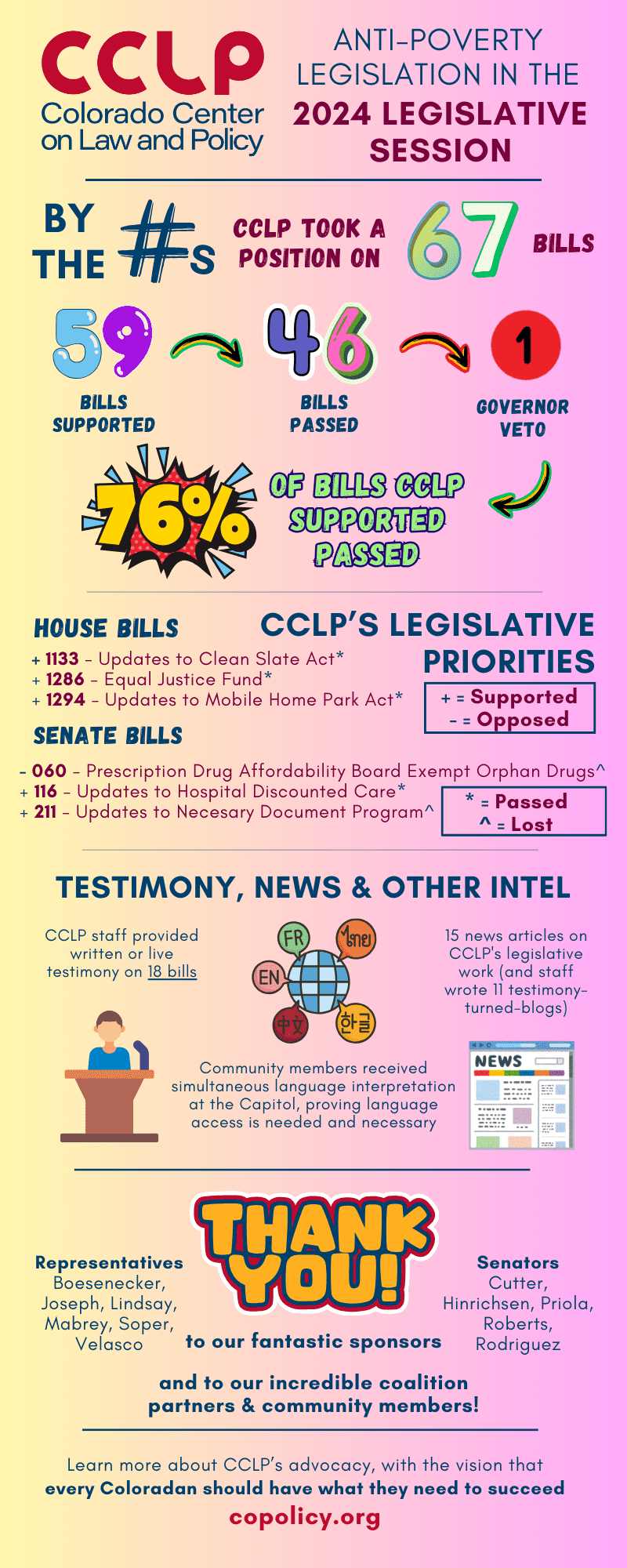A summary of the list of recommendations on the implementation of the OBBBA in Colorado regarding public benefits systems and work requirements.
Recent articles
CCLP testifies in support of Colorado’s AI Sunshine Act
Charles Brennan provided testimony in support of Senate Bill 25B-004, Increase Transparency for Algorithmic Systems, during the 2025 Special Session. CCLP is in support of SB25B-004.
Coloradans launch 2026 ballot push for graduated state income tax
New ballot measure proposals would cut taxes for 98 percent of Coloradans, raise revenue to address budget crisis.
CCLP statement on the executive order and Colorado’s endless budget catastrophe
Coloradans deserve better than the artificial budget crisis that led to today's crippling cuts by Governor Jared Polis.
CCLP’s 2024 legislative wrap-up, part 2

Preserving affordable communities
CCLP supported housing and transit initiatives centering community priorities and furthering a path toward affordability for all renters in Colorado, including mobile home park residents. Another one of our priority bills falls under this category, HB24-1294, Updates to the Mobile Home Park Act.
In 2019, CCLP led the passage of the Mobile Home Park Act, adding further protections in 2020 and 2022. This year’s bill again builds on these protections by bringing greater transparency in “Rent-to-Own” agreements, providing greater language access for limited-English proficient residents, creating efficiencies in the dispute resolution and enforcement program, clarifying enforcement of park rules and regulations, ensuring notices and park meetings are accessible, and bringing other technical corrections to the original Mobile Home Park Act.
In recent legislative sessions, housing advocates have been pushing for tenant rights bills in one of the hardest states to find affordable housing. Many iterations of these bills finally passed this year, an incredible feat for countless hours of conversations, research, stakeholdering, and the like. HB24-1175, Local Governments Rights to Property for Affordable Housing, was signed into law on May 30, 2024, on the heels of the Governor’s veto just last year. This new law allows local governments to have a right of first refusal or offer when purchasing property to provide long-term affordable housing. Additionally, HB24-1098, Cause Required for Eviction of Residential Tenant, also known as For Cause Eviction, became law after failing to pass the Senate last year. Cause is now required for a landlord to not renew a lease and proceed with an eviction. The effect of this bill will be to keep more Coloradans housed.
Anti-discrimination housing bills were also a hot topic this year. HB24-1007, Prohibit Residential Occupancy Limits, prohibits local governments from establishing residential occupancy limits based on familial relationship, but does allow them to implement limits based on demonstrated health and safety concerns. Occupancy limits have previously been used to discriminate against families with children and also limits the supply of available affordable housing. HB24-1318, Modify Rental Premises Person with Disability, removes the provision that allowed landlords to ask individuals with disabilities to restore the interior of their housing premises upon their departure. This has long been an unseen issue for the disability community, as a person with a disability shouldn’t have to restore premises when previous accommodations or modifications were made for accessibility purposes.
There was an increase in transit bills this year to encourage Coloradans to use more public transit in and around their communities. SB24-032, Methods to Increase the Use of Transit, creates a statewide transit pass exploratory committee intended to produce a viable proposal for a statewide transit pass, and other programs like an ozone season transit grant program and a youth fare-free transit grant program. SB24-182, Support Surface Transportation Infrastructure Development, will support the development of surface transportation infrastructure and provide funding and operational flexibility needed to support the development of transit and train infrastructure. It will also provide transportation services to new Transit-Oriented Development projects, thus reducing both the number of drivers on the road and the pollution they create, while also lowering the cost of living, by improving access to affordable transportation options. CCLP is proud to have supported these bills, ensuring more affordable, accessible, and safe communities across Colorado.
Reducing health care costs
CCLP aimed to keep the health care industry accountable, ensuring it provides Coloradans with the care and coverage they need, honoring their commitment to the public good. Our final priority bill, SB24-060, Prescription Drugs Affordability Board (PDAB) Exempt Orphan Drugs, would have exempted certain drugs from review by the PDAB. CCLP opposed this bill on the basis of our support for comprehensive drug price review. Existing advantages for drugs with an orphan designation (a drug for a rare disease or condition[1]) have led manufacturers to focus disproportionately on rare conditions in the chase for greater profit, despite the impact on access for patients.[2] Thankfully, health advocates successfully blocked passage of that bill, and CCLP put support behind an alternative bill, HB24-1399, Discounted Care for Indigent Patients, which provides additional opportunities for input from patients and manufacturers.
In recent years, behavioral and mental health has been a topic of conversation among health advocates. Several of these types of bills were brought to the Colorado legislature with some, but not all, passing.
- SB24-001 continues the Youth Mental Health Services Program “I Matter” indefinitely. This program, established in 2021 and originally set to repeal in June 2024, provides access to mental health and substance disorder services for youth.[3]
- SB24-007, Behavioral Health First Aid Training Program, will establish a series of trainings on how to respond to challenges or crises in the office of suicide prevention.
- As many Coloradans know, health care systems and insurances are often difficult to navigate. Selecting the right plan can be a challenge. SB24-080, Transparency in Health-Care Coverage will require health insurance carriers to comply with federal transparency laws and to make available an internet-based self-service tool that provides real-time responses to a covered person’s questions concerning carrier prices that are based on cost-sharing information.
Unfortunately, those that did not pass this year include HB24-1066, Prevent Workplace Violence in Health-Care Settings and HB24-1040, Gender-Affirming Health-Care Provider Study. HB24-1066 would have established workplace violence prevention committees in health-care facilities to document and review workplace violence incidents and develop and regularly review a workplace violence prevention plan for the facility, as well as provide trainings and offer post-incident services to affected staff. Due to budget constraints, this is just one of the many bills unable to move forward in legislature. HB24-1040 would have required the Department of Public Health and Environment to conduct a gender-affirming health-care provider study, researching resources available, threats received, number of patients to provider ratio, and the types of services patients seek.
Other notable bills
While CCLP created a platform of five policy areas to focus on this legislative session, CCLP also supported several bills which fell into multiple categories or fell outside our policy priorities:
- SB24-053, Racial Equity Study will establish the Black Coloradan racial equity commission to conduct a study to determine, and make recommendations related to, any historical and ongoing effects of slavery and subsequent systemic racism on Black Coloradans that may be attributed to Colorado state practices, systems, and policies to address these effects.
- Similarly, HB24-1444, Federal Indian Boarding School Research Program, will recreate and reenact the 2022 bill that created the original program as it was repealed at the end of 2023. The program will be required to conduct research regarding the physical abuse and deaths that occurred at federal Indian boarding schools in Colorado and to provide recommendations to better understand the abuse that occurred and to support healing in tribal communities. Both bills urge Coloradans to recognize the systemic racism and harm done to these communities throughout our state’s history.
Other health-related bills we supported included:
- HB24-1262, Maternal Health Midwives, which will update the title of these professionals, create a study to review maternal and infancy facility and provider closures, and recommend best practices to protect communities.
- HB24-1355, Measures to Reduce the Competency Wait List, which will reduce the competency wait list by creating a wraparound care program as a community-based alternative to competency proceedings. This is to increase the success of eligible individuals referred from the criminal justice system by connecting the individuals to necessary wraparound care coordination services, resulting in case dismissal, continuity of care, and increased social stability.
Last year, CCLP heavily focused on consumer protections in relation to medical debt. This year, HB24-1380, Regulation of Debt-Related Services, was introduced to make certain actions done by a debt collector or collection agency are subject to the “Colorado Fair Debt Collection Practices Act” unfair or deceptive trade practices under the “Colorado Consumer Protection Act.” This bill ensures there is an increase in consumer protections in transactions with debt-related services. For example, such debt collectors must list the original creditor, then the name of the collector to be a plaintiff in any debt collection legal action. CCLP knows debt can be a leading cause of poverty and this bill will continue to protect Coloradans from aggressive debt collectors and agencies.
Conclusion
As with most statutory changes, now begins the process of creating smooth processes for implementation. One such process is rulemaking. Rulemaking is often an essential step toward making a policy into real change. Rules fill in the details of programs and policies and help them function smoothly and fairly (or not).[4] For advocates, implementation is just as critical as the legislative process. This is the time to educate the public and provide resources about how a bill will or will not affect them. Oversight of implementation is critical to ensure the policy will work as intended.
But what happens if a bill does not pass? Many times, coalitions will continue to fight for a bill — looking for ways in which the bill can pass in future years, or even seeing if change can be made in other, nonlegislative ways. Either way, anti-poverty advocates involve themselves at every step of the way, ensuring community voices and concerns are uplifted.
With our 26th legislative session in the books, we want to thank our fantastic sponsors, incredible coalition partners, and amazing community members willing to share their experiences to make definitive change to ensure every Coloradan has what they need to succeed.
**********
[1] https://www.fda.gov/patients/rare-diseases-fda
[2] https://copolicy.org/news/cclps-legislative-watch-for-april-5-2024/
[3] https://www.imattercolorado.org/about.html
[4] Pray, B. (2022). On Rulemaking in Health and Public Benefits. Internal CCLP report: unpublished

